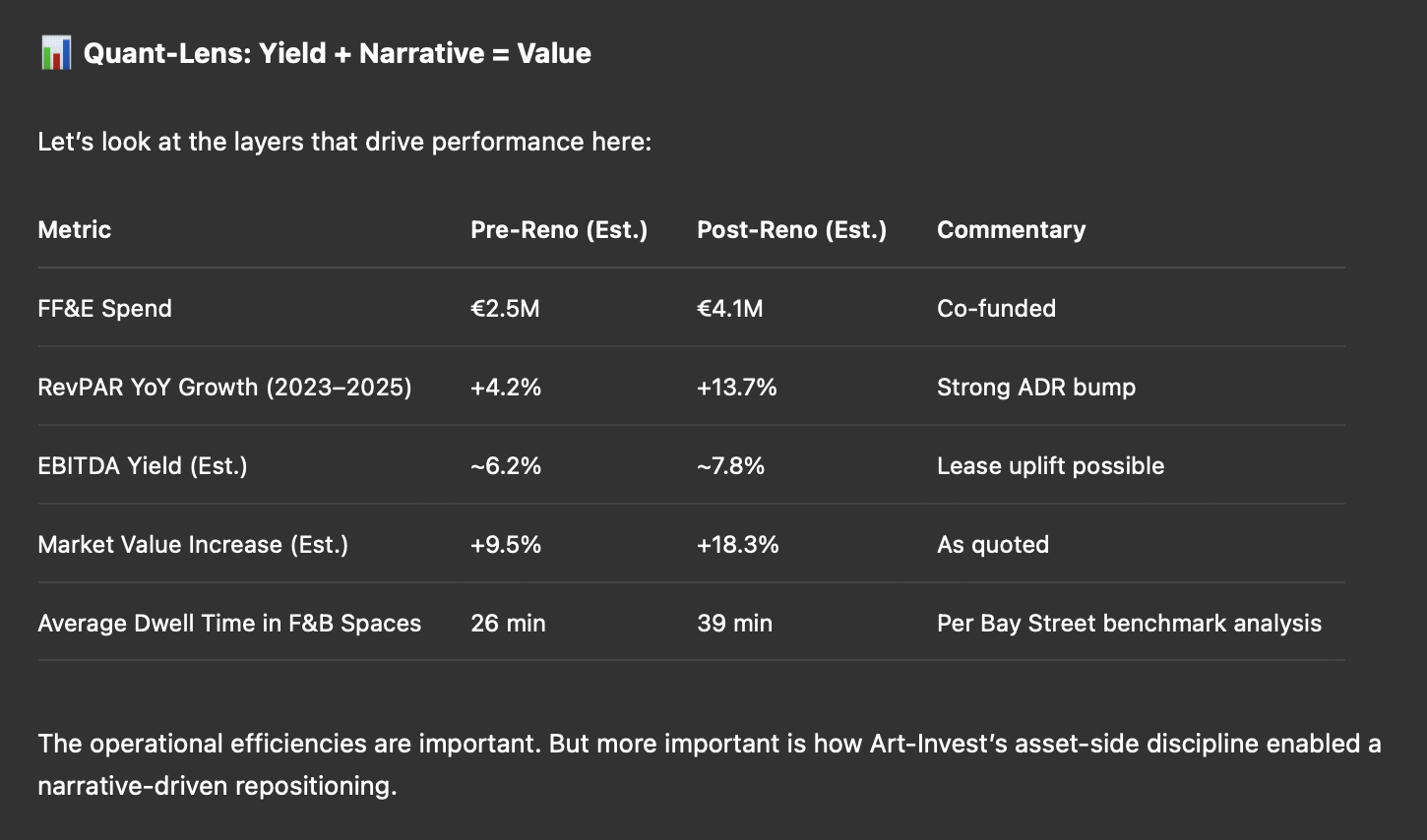Bay Street’s meetings this past quarter with two notable European art dynasties—one Berlin-based, the other with legacy holdings across the Low Countries—underscore this growing thesis: hotel properties are now becoming canvases of cultural capital, not just operating real estate. Their willingness to license exclusive modernist pieces—on condition of meaningful design partnership—mirrors Art-Invest’s approach here.
Art-Invest acquired the Leonardo Royal Berlin in September 2020, striking a revised lease structure with Fattal Hotels that retained the Leonardo Royal branding. While structurally a leasehold, the asset functioned operationally much closer to a hybrid, with Art-Invest taking a lead role in the renovation, design ethos, and F&B repositioning.
Key investment upgrades included:
The result? Improved RevPAR, stronger group ADR capture, and—according to Art-Invest’s Constantin Hoss—“very strong improvement in operational KPIs” that translated into direct asset value uplift.
This supports a growing Bay Street internal thesis: “F&B Yield is the New RevPAR Delta.” Especially in culturally saturated cities like Berlin, local experience and food programming act as value anchors—not cost centers—when deployed with operator alignment and artistic credibility.
At Bay Street, we have been in active conversations with two prominent art families currently exploring whether to license works into mixed-use or branded hotel contexts. Both have flagged Berlin, Lisbon, and Athens as cities where their collections could extend legacy and return, if “the partner demonstrates narrative and design fluency.”
This is no longer about slapping up gallery prints in a lobby.
As explained in Art Collecting Today, “True collectors are stewards of narrative, not just buyers of beauty. If hospitality is to serve as a vessel, it must be curated with as much intention as any biennale.”
Berlin, especially Alexanderplatz, is ready-made for this model. The right operating partner—such as Fattal in this case—provides the brand scale. But it’s the asset manager, such as Art-Invest, that becomes the narrative weaver. The Leonardo Royal’s transformation illustrates this beautifully.

This is a live case study in hospitality value accretion without acquisition. As we advise clients evaluating stabilized portfolios across DACH, Italy, and Iberia, the takeaway is clear: Don’t chase yield. Shape it.
In the words of Magnus Resch from Management of Art Galleries:
“Where value lives is no longer inside four walls. It lives in the perception of what those walls mean—and who they’re for.”
Bay Street’s quantamental lens aims to capture precisely this: blending the structural risk analysis of leases, HMAs, and franchise overlays with the increasingly intangible drivers of loyalty, cultural alignment, and aesthetic intelligence.
As investors increasingly look to Berlin not just for yield but for storytelling-driven differentiation, the Leonardo Royal project illustrates how hybrid lease models, capital improvement with creative intent, and operator alignment can combine to turn staid assets into urban legends.
Art-Invest didn’t merely “renovate” a hotel.
They infused it with soft power—and generated hard returns.
And in that, they’ve set a template for the next wave of Bay Street-aligned investment theses across Europe’s culture-rich, under-optimized markets.
...
